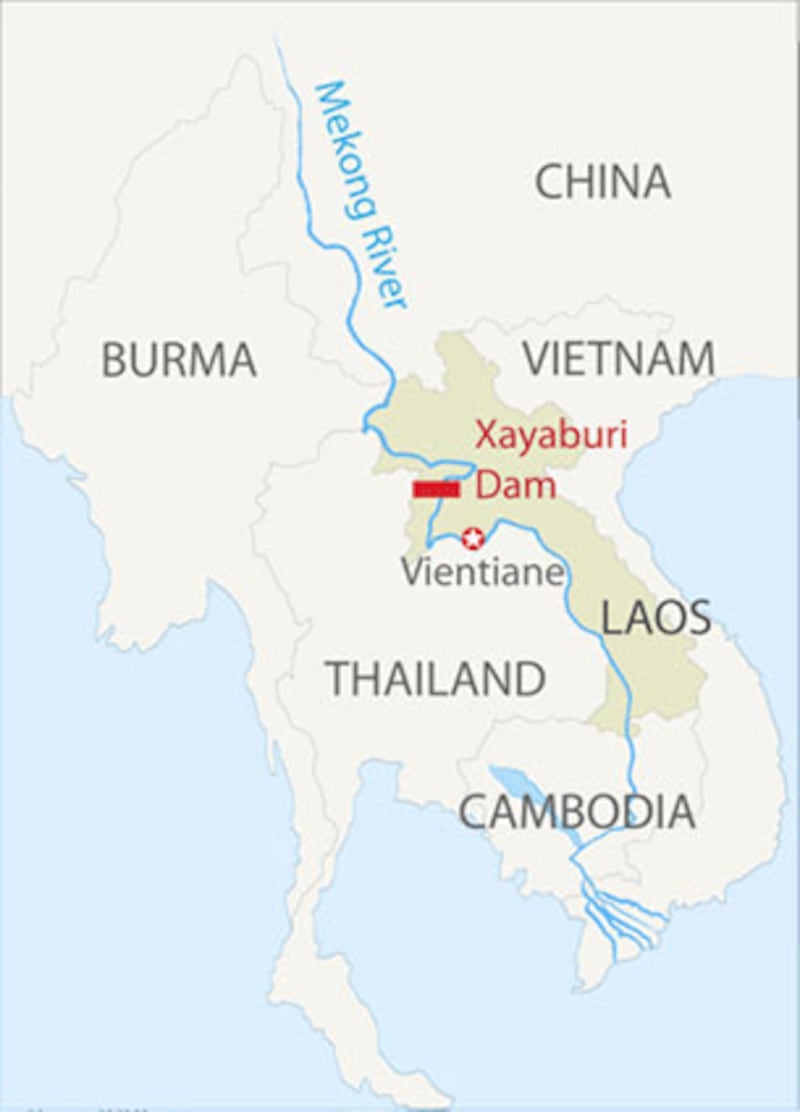A Swiss company has defended its endorsement of a controversial dam project along the Mekong River in Laos after it came under fire from conservation groups who say it will adversely affect the region.
Poyry Energy AG had said in a report to the Lao government that the U.S. $3.8 billion Xayaburi project should be built after conducting a three-month evaluation of the project’s compliance with regional requirements for mainstream dams.
The government has yet to publicly disclose the report, but a leaked copy has recently been widely circulated.
U.S.-based conservation group International Rivers slammed the report yesterday, saying it “sidesteps science and relies instead on guesswork, making it an unsuitable basis for decision-making on the Xayaburi Dam” and that Poyry falsely claimed concerns from neighboring countries about the project had been addressed.
A Poyry spokesperson responded Thursday, saying the report was “based on comprehensive technical analysis supported by our company’s extensive experience in the field.”
The company was not tasked to include a feasibility study or environmental and social impact assessments.
The spokesperson was unable to comment on Poyry’s findings or recommendations due to the client-confidential nature of the assignment, saying that any release of information regarding the report was at the discretion of the Lao government.
Poyry also addressed allegations by International Rivers that the Lao government, which has lobbied hard for international approval of the dam, commissioned the company specifically because of its “long history of involvement in controversial projects” on the Mekong and its “close ties” to the dam’s main builder, CH. Karnchang Public Company Limited.
“We would like to stress that Poyry has no conflict of interest in the Xayaburi project,” the spokesperson said, adding that the company’s work for the completed Nam Ngum 2 hydropower dam in Laos is on a limited basis and that CH. Karnchang is “only one minority shareholder” in the project.
“Every year Poyry works in more than 10,000 different projects all around the world with a large number of clients. In South East Asia most of the companies operating in power sector are our clients, Nam Ngum 2 Power Company being one of them.”
“Poyry has no partnership or special relationship with CH. Karnchang,” the spokesperson said, adding that the company is a “trusted independent advisor in [the] energy sector.”
Project evaluation
The Lao government hired Poyry in May to undertake a three-month evaluation of the project’s compliance with Mekong River Commission (MRC) requirements after the regional body decided in April to defer any decision on the project to the end of 2011.
The MRC, which consists of Laos and neighbors Thailand, Vietnam, and Cambodia, concluded at the time that the potential for damage to rice farming and fishing communities along the river warranted the suspension of work on the dam.
In early September, the Lao government announced that the Poyry report would be presented to neighboring governments as part of a plan to begin full construction on the dam before the end of the year.
An MRC official confirmed to RFA Wednesday that the organization had received the report and was in the process of reviewing it.
International Rivers said it had identified at least 15 “fundamental” MRC requirements with which the Xayaburi Dam still does not comply.
In particular, the group noted the report’s lack of provisions for an MRC requirement that the dam include safe passage for at least 95 percent of key fish species.
Instead, it said, Poyry promoted technologies that have never been applied on the Mekong River or used successfully in any tropical river.
The river conservation group said it found several other shortcomings in the Poyry report, including analysis of ecosystems, sediment flows, and dam safety.
International Rivers also accused Poyry of falsely claiming that a regional prior consultation process on the Xayaburi had already been completed and that the Lao government could make a unilateral decision on whether to proceed on the dam.

Dam criticism
Critics of the dam say it would destroy the river’s ecology and disrupt the livelihood of riparian communities that rely on it for their livelihood.
They also fear that proceeding with the Xayaburi dam would give a green light to construction on as many as 10 other hydropower projects planned for the lower Mekong.
Several groups have issued warnings that any dam built in the area may be at risk of collapse because the site is prone to earthquakes.
With plans to build a total of 70 hydropower projects, Lao officials have said the country hopes to become “the battery” of Asia.
A decision on the Xayaburi Dam is expected to be made at the upcoming MRC Council meeting, scheduled for Dec. 7-9 in Siem Reap, Cambodia.
Reported by RFA’s Lao service. Translated by Max Avary. Written in English with additional reporting by by Joshua Lipes.
